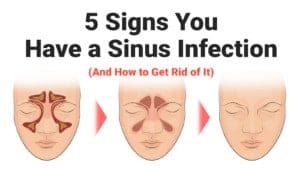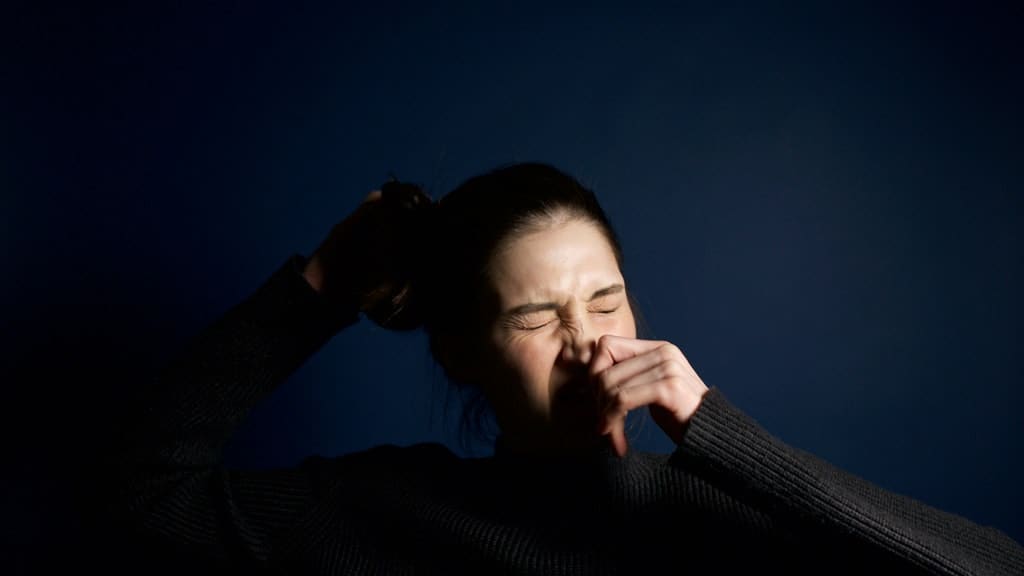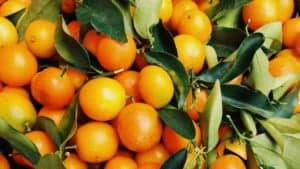We’ve all felt the runny nose and eyes, nasal congestion, head feeling like it weighs 20 pounds and the tender-to-the-touch face. They’re symptoms of a sinus infection or sinusitis. Because a virus causes the condition in most cases, there’s technically no cure for it. There are things we can do to make it feel better, but the sad truth is we have to gut it out until the infection runs its course.
Back in the day, our mothers and grandmothers held our towel draped heads over a boiling pot of water. We inhaled the steam and felt approximately better. Sometimes they would rub something awful smelling beneath our noses or had us drink something from a black bottle. We shuddered to drink it or sniff it, but the stuff worked.
Today, doctors give us steroids for the inflammation and pain pills for sinusitis. However, more and more people are turning to natural methods of pain relief due to the side effects of chemical medications. Doctors understand this, and they even have a few hints of their own. So what does science say about kicking sinusitis’ butt without drugs?
Precisely What Is Sinusitis?
The sinuses are empty cavities surrounding the nose and the eyes, in the cheeks, and the forehead. While the sinuses are hollow, mucus drains from the nose, taking bacteria and dirt with it. When the mucus backs up into the sinuses, the bacteria, fungi, and dirt seep into the cavities. The moist atmosphere is ideal for the growth of viruses.
The mucous membranes in the nose become swelled through inflammation or infection. The sinuses are no longer clear. They back up with mucus and other material. A cold or allergies are usually the triggers for an outbreak. How can this condition be healed without drugs?
What Does A Sinus Infection Do To The Body?
The first thing you’ll notice is a headache. It may or may not get worse if the head moves or the face is touched. This discomfort is often made worse by the sore throat and coughing to get the mucus out. Many people have a cough that won’t stop.
Dental pain, eye pain, and ear pain often accompany a sinus infection. The inflammation puts pressure on the soft tissues and nerves in the mouth, eyes, and ears. Know that as soon as the swelling is over, the dental, eye, and ear pain will be as well.
Just like coughing and watery eyes, fever is a method of ridding the body of an infection or illness. On the other hand, this dehydrates the body very severely. A serious amount of water is necessary to avoid serious illness or health conditions.
All of this makes us tired. Fatigue is common when we’re down sick, and lots of sleep is the only way to battle it.
How Can Sinusitis Be Healed Without Drugs?
The answer to that has been used for thousands of years in Europe and Asia in healing illnesses and conditions caused by inflammation. Only recently has the idea caught on in a big way in America. Our moms and grandmothers knew what they were doing when they told us to “eat your medicine.” Doctors are now advising their inflammation patients to load up on the following foods and herbs.
Omega-3 Fatty Acids
Omega-3 fatty acids come from oily fish such as sardines, fresh tuna, and salmon, as well as some herbs and plant foods. Omega-3s have benefits for the brain in balancing mood and helping with Alzheimer’s, and it helps with metabolic conditions like diabetes and heart disease. Omega-3s benefit the skin, eyes, brain, as well as the immune system. To get them, you should eat:
- Spices. Ginger, turmeric, basil, cayenne, black pepper, and chili peppers. The cayenne, black pepper, and chili peppers are known to open up the sinuses. So is horseradish.
- Fruits. Some fresh fruits such as tart cherries, grapefruit, oranges, berries reduce inflammation. Tomatoes, apples, and pears contain Quercetin, which acts as an antihistamine in reducing inflammation.
- Avacado, beans such as pinto and kidney, red bell peppers, and green veggies like broccoli, asparagus, leafy green vegetables, and bean sprouts all contain Omega-3s.
- Green tea not only contains Omega-3s but drinking lots of water also keeps the body hydrated. Hydration staves off serious illnesses.
Foods That Cause Inflammation
To be fair, a balance must be struck. If the above-listed foods help control or heal inflammation, you should know the foods that cause it:
- Refined white sugar and flour products like commercially produced cakes, cookies, bread, pastries, and the like.
- French fries and other fried items like fast foods.
- Processed meats like lunch meats, breakfast meats, and pretty much anything made for you to heat ‘ n’ eat.
- Sugary drinks like soda, juices, and some energy drinks.
- Margarine, milk, and dairy products.
- Refined carbs like pasta, rice, bread, and instant mashed potatoes.
Nourish Your Body
Preventing bacteria from entering the body and viruses from doing their damage in the first place can be facilitated by eating foods that boost the immune system. The immune system isn’t tangible, like the heart or spleen. Along the body’s nerve pathways are the cells and proteins, the immune system uses to battle incoming bad guys.
Boosting the immune system has more to do with what you do than with what you eat, although foods do play a part in immune system health. To boost the immune system, either control or eliminate stress from your life through meditation or mindfulness. Don’t smoke tobacco products.
Get enough restful sleep. Exercise regularly, even if it’s only a walk around the block. Don’t drink much alcohol. Be aware of some of the causes of infections like touching doorknobs or picking up the phone. Wash your hands frequently, and don’t touch your face until you do.
In spite of all this, an ill-intentioned bacteria (the complete opposite of the millions of good bacteria in the body) could get through. The cells and proteins will surround the incoming bad guy cells to obliterate them. To feed the immune system, you should eat:
Foods That Can Help You Recover From Sinusitis
- Dark chocolate. There are three ways to get free radicals: from converting food to energy, from the sunlight interacting with skin and eyes, and from breathing in oxygen. Free radicals harm the body’s cells. Antioxidants put free radicals out of business. Dark chocolate is packed with antioxidants.
- Blueberries. Same job, different color, and taste.
- Sweet potatoes. The beta carotene that gives the food its color is also an antioxidant fighting free radicals. Other fruits and vegetables containing beta carotene and carotenoids are apricots, watermelon, asparagus, tomatoes, beets, tangerines, broccoli, spinach, cantaloupe, pumpkin, carrots, squash, corn, peaches, green and red peppers, nectarines, kale, turnip greens, collard greens, and mangoes.
- Garlic. A whole garlic clove contains aliin (no, it isn’t misspelled.) When you chew garlic, this compound turns into allicin (correctly spelled.) Garlic aids the immune system in fighting off germs and bacteria.
- Almonds. Also, a source of Vitamin E, almonds contain manganese, magnesium, and fiber as well. These benefit the immune system, too.
- Vitamin C in foods like tomatoes, berries, snow peas, Brussels sprouts, onions, red, green, and yellow peppers, cauliflower, papaya, honeydew, and kiwi.
- Vitamin E can be found in broccoli, sunflower seeds, carrots, spinach, chard, red peppers, mustard greens, turnip greens, papaya, and mangoes. Vitamins C and E are antioxidants that fight free radicals.
We’ve discussed the foods that boost the immune system, but you should also remember the herbs and spices you reach for while cooking will do the same job. Turmeric, ginger, garlic, and black pepper are among a few listed above.
A few more are:
Spices and Herbs that Boost Your Immune System
- Ginseng. A Chinese herb used to boost the immune system, it also clears the respiratory tract.
- Cinnamon. Popularly known as a topping for French toast and used in many foods and drinks, cinnamon contains a compound called cinnamaldehyde. This has anti-bacterial properties that fight infections and viruses, both of which are involved in sinusitis. Cinnamon is high in the immune system-boosting antioxidants.
- Echinacea. Many people take this pretty daisy-like flower and make a tea out of it. The leaves, flowers, and stems can be used either dried or fresh. The herb aids in immune strength, respiratory system strength, and helps fight colds and flu.
- Honey. It might not be an herb or a spice, but honey is a potent anti-inflammatory, and it kick-starts the immune system’s response to incoming bad guys.
- Oregano. This herb contains compounds that are antiviral, antibacterial, and antifungal, all of which are involved with a sinus infection. Additionally, the fiber, antioxidants, minerals, and Omega-3s also help the immune system fight off infections.
 Final Thoughts on Recovering from a Sinus Infection
Final Thoughts on Recovering from a Sinus Infection
Sinusitis is nothing to mess with. It’s painful and leads to lost days from work and a tense family relationship while it lasts. Antibiotics don’t work on the virus that usually causes the illness, so medications can’t heal you.
However, the oldest medicine ever invented can help heal sinusitis. The foods you eat send their healing properties to the areas of the body needing them the most. They also strengthen your immune system. Want to feel better? Dig in!




















